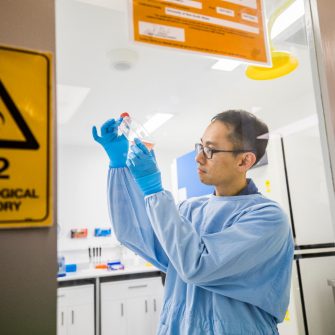Graduate Certificate in Computing
- Commencing Terms
- Term 1, 2 & 3
- Duration
- 0.7 Year(s)
- Delivery Mode
- Face-to-face (includes blended)
- Campus
-
Kensington
- Codes
- Program code 7543
- CRICOS code 052690E
-
2026 Indicative first year full fee
- $22,000*
-
2026 Indicative full fee to complete degree
- $22,000*
-
2026 Indicative first year full fee
- $31,500*
-
2026 Indicative full fee to complete degree
- $32,000*

Find a postgrad program to match your personality
Tuesday, 17 March (6–7pm AEDT)
Join us for Career Connect, an interactive online experience designed to help you uncover career pathways that truly align with your personality.
Gain expert insights and personalised recommendations for postgraduate courses that support your goals.
Application closures for 2026
International applications for all undergraduate programs, as well as postgraduate programs offered by the faculties of Arts, Design & Architecture, Engineering (excluding Master of Information Technology and associated programs) and Science are now closed to New Overseas Student Commencement (NOSC) for 2026 intakes.
Postgraduate programs offered by the Business School and the faculties of Law & Justice and Medicine & Health remain open. Master of Information Technology (and associated programs) also remain open.
- Overview
- Entry requirements
- What will I study?
- Future careers
- How to apply
- Fees & Scholarships
Overview
The Graduate Certificate in Computing is a flexible program designed for those looking to advance their knowledge in computing or build a foundation for further studies in computer science and IT. Whether you’re updating your skills, pivoting into a computer science career or exploring pathways to advanced qualifications, this program offers the ideal starting point.
Choose from a wide range of electives, from artificial intelligence and bioinformatics to database systems and e-commerce, and tailor your study to align with your interests and goals. With options for both introductory and advanced courses, this certificate is perfect for professionals seeking career advancement or graduates looking to explore emerging areas in computing.
Graduates of this program gain knowledge in critical areas of computing and IT, with opportunities to progress into the Graduate Diploma in Information Technology or the Master of Information Technology, both with credit for completed courses.
Key features
- Build your study plan
Select from a broad range of electives across cutting-edge and traditional computing topics, including artificial intelligence, bioinformatics, databases and computing systems. Whether you’re new to computing or building on prior experience, you’ll find courses to match your learning needs and ambitions.
- Pathway to advanced qualifications
This program offers a direct pathway into the Graduate Diploma in Information Technology or the Master of Information Technology. Your completed courses will count towards your Recognition of Prior Learning (RPL), making it easier to transition into further study.
- Develop in-demand skills
According to the National Skills Commission, Information and Communication Technology (ICT) professionals are in increasingly high demand due to skills shortages – particularly among database and systems administrators, and ICT security specialists. In this computer science course, you’ll gain advanced enquiry-based learning, critical thinking and communication skills, along with adaptive and interactional abilities essential for the fast-changing IT landscape.
Why study at UNSW?
Join Australia’s #1 Engineering Faculty
The Computer Science and Engineering School is part of the Faculty of Engineering, which is ranked #1 in Australia and #25 globally for Engineering and Technology. We're also ranked #4 in Australia for Computer Science. All eight of UNSW's Engineering schools are ranked in the global top 50 with two schools ranked in the global top 10 for Engineering subjects (QS World University Rankings by Subject, 2025). Our School of Computer Science and Engineering leads the nation in areas like artificial intelligence, algorithms and databases.
Learn from cutting-edge research and industry leaders
Benefit from UNSW’s strong research culture, with world-class facilities and discoveries integrated into your learning. Our industry partnerships with Atlassian, Google, Microsoft, and more ensure your education is relevant to real-world challenges.
Unparalleled graduate employability
UNSW graduates are highly sought after, with UNSW awarded the Most Employable students for seven years in a row (Australian Financial Review (AFR) Top100 Future Leaders Awards, 2020–2026).
Want to see more from UNSW Engineering?
Entry requirements
Admission to this program requires one of the following:
- 3-year undergraduate degree equivalent to a standard Australian Bachelor degree with a minimum 65% average; or
- minimum 3-years' work experience in the area of science or engineering.
Those without such a qualification or experience may submit an application on the basis of a combined education and work experience. Applications will be considered on a case-by-case basis.
Admission pathways
5543 Infomation Technology, 8543 Information Technology
English language requirements
You may be asked to provide evidence of your English proficiency to study at UNSW depending on your educational background and citizenship. English language skills are vitally important for coping with lectures, tutorials, assignments and examinations - this is why UNSW requires a minimum English language competency for enrolment.
If you’re completing an Australian Year 12 qualification (e.g. NSW HSC or equivalent), you do not need to provide anything extra to prove your proficiency. Your qualification will be used as evidence of your English proficiency.
If you do need to provide evidence of your English proficiency, this will be indicated in your application. You can prove this by providing evidence that you meet one or more of the following criteria:
- English language tests and university English courses
- Prior study in the medium of English
- Other qualifications
If you need to improve your English skills before you start your degree, UNSW College’s Academic English Programs are for you. The programs are suitable for various English levels and help you prepare for university studies and life in Australia.
For more details, visit the English Language Requirements page.
Admission to this program requires one of the following:
- 3-year undergraduate degree equivalent to a standard Australian Bachelor degree with a minimum 65% average; or
- Minimum 3-years' work experience in the area of science or engineering.
Those without these qualifications or experience may submit an application on the basis of a combined education and work experience. Applications will be considered on a case-by-case basis.
Admission pathways
5543 Information Technology, 8543 Information Technology
English language requirements
You may be asked to provide evidence of your English proficiency to study at UNSW depending on whether you are from an English-speaking background or non-English speaking background. English language skills are vitally important for coping with lectures, tutorials, assignments and examinations - this is why UNSW requires a minimum English language competency for enrolment.
If English is not your first language, you’ll need to provide proof of your English proficiency before you can be given an offer to study at UNSW. You can do this by providing evidence that you meet one or more of the following criteria:
- English language tests and university English courses
- Prior study in the medium of English
- Other qualifications
If you need to improve your English skills before you start your degree, UNSW College’s Academic English Programs are for you. The programs are suitable for various English levels and help you prepare for university studies and life in Australia.
For more details, visit the English Language Requirements page.
Check the specific English language requirements for this program
What will I study?
UNSW is introducing a new academic calendar from 2028.
We are moving to a new flex-semester calendar. What does this mean for your studies?
Program structure
In the Graduate Certificate in Computing, you’ll study a range of subjects that will help you unlock your earning potential. The Graduate Certificate in Computing allows post-study flexibility and an interesting variance of career choice for your future.
Full program structure
The Graduate Certificate in Computing is a program made up of 24 Units of Credit. This program consists of four courses that can be studied in a full-time or part-time load.
In this certificate, you have the choice of studying 4 courses from any of the following areas:
- General Information Technology/Computer Science courses
- Cybersecurity
- Database Systems
- Artificial Intelligence
- Programming Languages
- Computer Networks
- Embedded Systems
- Security Engineering
- Internetworking
- Data Science and Engineering
Upon completion of this certificate you may be eligible to progress to further study, including the Graduate Diploma in Information Technology or the Master of Information Technology, your courses in this certificate will be credited towards your articulated program of choice. Prior learning credit points may be taken into account.
Future careers
Unlock your potential with the Graduate Certificate in Computing from UNSW. Whether you’re aiming for a senior role, specialised expertise or a career pivot, this program equips you with the skills and knowledge to thrive in the rapidly evolving tech landscape.
From advancing in your current role to breaking into high-demand fields like cybersecurity, Defence and aerospace, this qualification will help you stand out and climb the career ladder faster. By mastering cutting-edge computing and computer science concepts, you’ll be prepared to tackle real-world challenges and deliver innovative solutions across industries.
Graduates of this program are well-positioned to make an impact in a wide range of industries, including:
- Aerospace
- Agriculture
- Cybersecurity
- Defence
- Finance
- Government
- Manufacturing
- Mining
- Research
- Research and Development
- Software Industry
- Telecommunications
- Transport
Potential careers
With the Graduate Certificate in Computing, you’ll open doors to exciting computer science jobs like:
Computer Scientist
Information Systems Manager
IT Specialist
Software Developer
Software Engineer
Systems Administrator
How to apply
Applications must be submitted through our Apply Online portal. We encourage you to submit your completed application as early as possible to ensure it will be processed in time for your preferred term. Some high-demand programs and faculties with limited places may have an earlier application deadline or commencement date. Find out more.
Ready to start your application?
For most international students, applications are submitted via our Apply Online service. We encourage you to submit your completed application as early as possible to ensure it will be processed in time for your preferred term. For more information visit our international applicant information page.
UNSW has a quota system, that ensures the faculty's enrolment is maintained at a level that maximises the quality of the teaching and learning experience at UNSW. Please be aware this is a high volume program and UNSW reserves the right to amend the application and acceptance deadline in order the keep within those limits.
Ready to start your application?
Fees & Scholarships
*Fees are subject to annual review (or when required) by the University and may vary accordingly.
Indicative fees are a guide only and have been calculated based on the typical enrolment patterns of students undertaking the program. The indicative fees listed here is an estimate for tuition only and excludes non-tuition fees and charges. The amount you pay will vary depending on the calendar year of enrolment, the courses you select and whether your study load is more or less than 1 Equivalent Full Time Student Load (48 units of credit (UOC) per year).
You should not rely on indicative fees as fee increases are assessed when required and may exceed the indicative figures listed here. Actual fees are calculated on enrolment. More information on fees can be found at the UNSW fees website.
*Fees are subject to annual review by the University and may increase annually, with the new fees effective from the start of each calendar year. The indicative fees listed here are based on an estimated average and are for tuition only, other fees and charges are not included. The amount you pay will vary depending on the calendar year to enrol, the courses you select and whether your study load is more or less than 1 Equivalent Full Time Student Load (8 courses per year).
Indicative fees are a guide for comparison only based on current conditions and available data. You should not rely on indicative fees. More information on fees can be found at the UNSW fees website.
Indicative fees to complete the program have been calculated based on a percentage increase for every year of the program. Fee increases are assessed annually and may exceed the indicative figures listed here.
Indicative fees to complete the program include tuition plus an estimate of study-related costs of approximately $1,000 per year. To find out more about other costs, visit UNSW International.
Scholarships
At UNSW, we award over $83 million in scholarships each year. We pride ourselves on rewarding excellence and making university accessible to students from all walks of life. Whether you’re a domestic or international student, our range of scholarships, prizes and awards can support your journey.
Progress starts here – at a world-leading university

Top 20 Worldwide
UNSW is ranked #20 university in the world
QS World University Rankings, 2024–2026

Most Employable Graduates
Winner of the AFR Most Employable University Award seven years in a row
AFR Top100 Future Leaders & Graduate Employers Awards, 2020–2026

Australia's #1 for Innovation
Highest number of startups and spinouts from university-developed tech
SCOPR report, 2024




